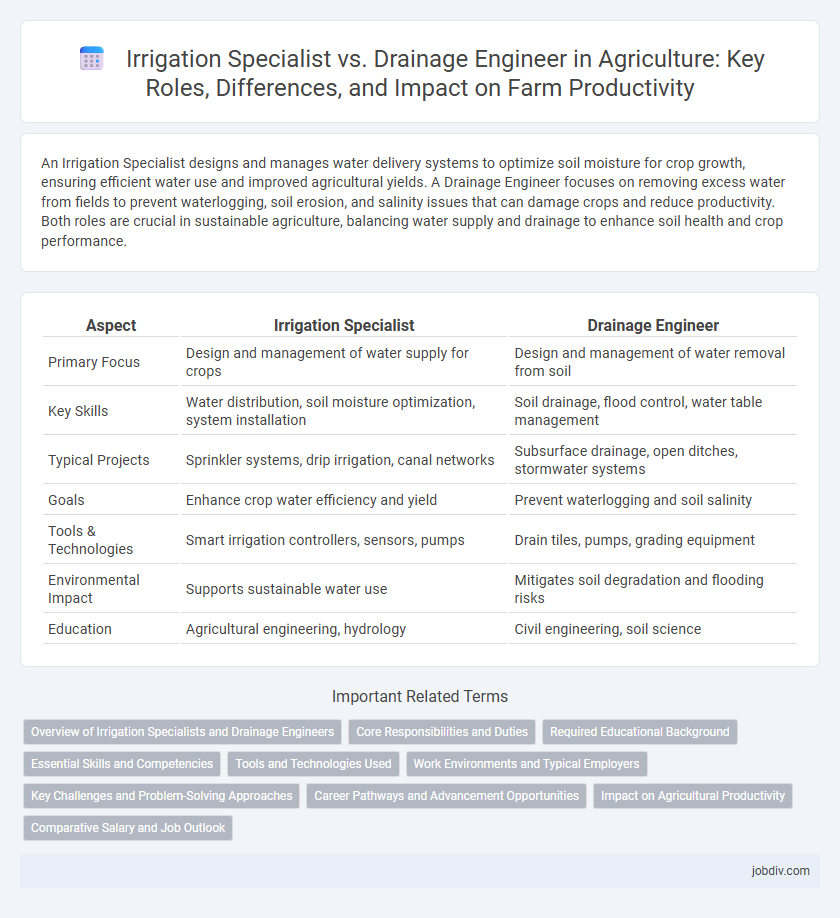An Irrigation Specialist designs and manages water delivery systems to optimize soil moisture for crop growth, ensuring efficient water use and improved agricultural yields. A Drainage Engineer focuses on removing excess water from fields to prevent waterlogging, soil erosion, and salinity issues that can damage crops and reduce productivity. Both roles are crucial in sustainable agriculture, balancing water supply and drainage to enhance soil health and crop performance.
Table of Comparison
| Aspect | Irrigation Specialist | Drainage Engineer |
|---|---|---|
| Primary Focus | Design and management of water supply for crops | Design and management of water removal from soil |
| Key Skills | Water distribution, soil moisture optimization, system installation | Soil drainage, flood control, water table management |
| Typical Projects | Sprinkler systems, drip irrigation, canal networks | Subsurface drainage, open ditches, stormwater systems |
| Goals | Enhance crop water efficiency and yield | Prevent waterlogging and soil salinity |
| Tools & Technologies | Smart irrigation controllers, sensors, pumps | Drain tiles, pumps, grading equipment |
| Environmental Impact | Supports sustainable water use | Mitigates soil degradation and flooding risks |
| Education | Agricultural engineering, hydrology | Civil engineering, soil science |
Overview of Irrigation Specialists and Drainage Engineers
Irrigation Specialists design and manage water delivery systems to optimize crop hydration, focusing on efficient water use and soil moisture control. Drainage Engineers develop and maintain systems to remove excess water from agricultural land, preventing soil erosion and waterlogging that can impair crop yields. Both professionals collaborate to balance water management, enhancing agricultural productivity and sustainability.
Core Responsibilities and Duties
Irrigation specialists design and manage water distribution systems to optimize crop hydration and enhance agricultural productivity, focusing on efficient water use and soil moisture management. Drainage engineers develop and implement drainage solutions to prevent waterlogging, control salinity, and maintain optimal soil conditions for plant growth. Both roles require expertise in hydrology and soil science but differ in their focus on water application versus water removal in agricultural landscapes.
Required Educational Background
Irrigation specialists typically require a degree in agricultural engineering, soil science, or environmental science, emphasizing water management and crop irrigation techniques. Drainage engineers often hold degrees in civil or environmental engineering, focusing on hydrology, drainage system design, and flood prevention. Both roles benefit from coursework in fluid mechanics, GIS applications, and sustainable water resource management.
Essential Skills and Competencies
Irrigation specialists excel in designing and managing efficient water delivery systems, requiring expertise in soil-water-plant relationships, hydraulic engineering, and precision technology for optimal crop hydration. Drainage engineers focus on water removal and soil erosion prevention, emphasizing skills in hydrology, geotechnical analysis, and landscape morphology to maintain soil health and prevent waterlogging. Both roles demand proficiency in environmental regulations, project management, and the use of GIS and remote sensing tools for sustainable agricultural water management.
Tools and Technologies Used
Irrigation specialists utilize advanced drip irrigation systems, soil moisture sensors, and remote monitoring technologies to optimize water distribution for crop health. Drainage engineers employ subsurface drainage tiles, automated water control structures, and GIS-based hydrological modeling to effectively manage excess water and prevent soil salinization. Both professionals integrate precision agriculture tools such as GPS mapping and data analytics to enhance overall water management efficiency in agricultural fields.
Work Environments and Typical Employers
Irrigation specialists primarily work on farms, agricultural cooperatives, and government agencies focused on water resource management, ensuring efficient water use for crop production. Drainage engineers are commonly employed by civil engineering firms, environmental consultancies, and municipal agencies, concentrating on soil moisture control and flood prevention in both agricultural and urban settings. Both professionals often collaborate with agricultural extension services and research institutions to optimize land and water management practices.
Key Challenges and Problem-Solving Approaches
Irrigation specialists face key challenges such as optimizing water distribution efficiency and managing soil moisture levels to enhance crop yield, employing techniques like precision irrigation and real-time monitoring systems. Drainage engineers address problems related to excess water removal and soil salinity control by designing effective subsurface drainage networks and implementing sustainable land reclamation practices. Both professionals use data-driven solutions but focus respectively on maximizing water availability and preventing waterlogging to ensure agricultural productivity.
Career Pathways and Advancement Opportunities
Irrigation specialists focus on designing, managing, and improving water delivery systems to optimize crop production, often advancing toward roles in agricultural engineering or water resource management. Drainage engineers specialize in designing systems to remove excess water from fields, preventing soil erosion and waterlogging, with career growth leading to environmental consulting or civil engineering positions. Both pathways offer opportunities for specialization, project management, and leadership roles in agricultural technology firms, government agencies, or environmental organizations.
Impact on Agricultural Productivity
Irrigation specialists optimize water delivery systems to enhance crop growth, improve water use efficiency, and increase agricultural yields. Drainage engineers design and implement effective drainage solutions that prevent waterlogging, reduce soil salinity, and protect root systems, directly contributing to healthier crops and improved soil conditions. Both roles are critical in managing water resources to maximize agricultural productivity and sustainability.
Comparative Salary and Job Outlook
Irrigation specialists typically earn an average salary ranging from $60,000 to $85,000 annually, focusing on water delivery systems to optimize crop growth, while drainage engineers command salaries between $70,000 and $95,000, specializing in managing excess water to prevent soil erosion and flooding. Job outlook for irrigation specialists indicates steady growth at approximately 5% over the next decade due to rising demand for efficient water use in agriculture, whereas drainage engineers benefit from a slightly higher growth rate of around 7%, driven by increasing investments in sustainable land management and climate change mitigation projects. Both professions require strong expertise in hydrology and environmental engineering, but drainage engineers often engage more with infrastructure and environmental regulations, influencing their competitive salary and job market advantage.
Irrigation Specialist vs Drainage Engineer Infographic

 jobdiv.com
jobdiv.com